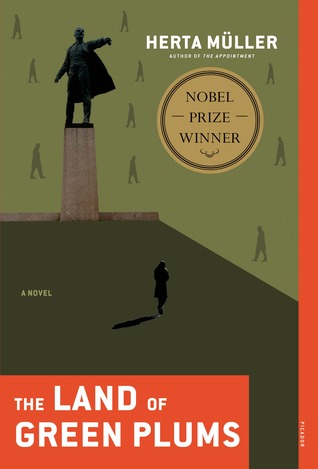"The Land Of Green Plums" by Herta Muller
 Nicolae Ceausescu’s police state in Romania was one of the most brutal out of all the communist block during the cold war years. Typical of such regimes, a cult of personality evolved around him and he used his secret police — the dreaded “Securitate” — to rule with an iron fist. During the fall of communism in 1989, there was a joke that went that Poland would take ten years, Czechoslovakia ten months and Romania, ten days. The revolution that saw the fall of Ceausescu’s regime began when one lone woman began yelling for the dictator to “shut up” as he was giving a speech. The army refused to turn on it’s citizens and on Christmas day, 1989, both the dictator and his wife were executed.
Nicolae Ceausescu’s police state in Romania was one of the most brutal out of all the communist block during the cold war years. Typical of such regimes, a cult of personality evolved around him and he used his secret police — the dreaded “Securitate” — to rule with an iron fist. During the fall of communism in 1989, there was a joke that went that Poland would take ten years, Czechoslovakia ten months and Romania, ten days. The revolution that saw the fall of Ceausescu’s regime began when one lone woman began yelling for the dictator to “shut up” as he was giving a speech. The army refused to turn on it’s citizens and on Christmas day, 1989, both the dictator and his wife were executed.
Herta Muller’s “The Land Of Green Plumbs” takes place at the height of Ceausescu’s regime. The narrator, a young woman of German descent, recalls her life during these bleak years. The narrative is typical of that sort of Eastern European surrealism which always appealed to me. Muller doesn’t write like anyone else I’ve read before. Her metaphors are colorful and weird yet lyrical and poetic. Which can make this a strange read at times. There really isn’t a plot to speak of and the narrative comes in short, non-linear bursts which describe the bleakness of Romanian society. There’s the narrator’s childhood, her friendship with Tereza, a woman suffering from cancer but refuses to see a doctor, the narrator’s best friend Lola, who commits suicide while at school; her student friends Kurt, Georg, and Edgar who all move from the country to the city only to discover the dictator’s presence over every aspect of life; the Securitate agent known as Captain Pjele who shadows their every move; their work life, which consists mainly of making things that no one wants or needs. Through their interaction you feel the yearning to be free. They try to communicate by subterfuge (leaving hairs in letters and utilizing specific punctuation marks in the salutation in order to send cryptic messages to one another). It is a nightmare society, where everyone is afraid and corrupt and no one can be trusted.
There’s an almost fairytale-like quality to the story. Coupled with the surrealistic imagery and metaphors, it sometimes reads like a dream or a collection of scattered, fading but still potent memories of someone looking back on a very bleak part of their lives. Between the lines one gets a good idea of what life must have been like under such a regime. It doesn’t beat you over the head with specific deeds but it’s there. You feel it. For fans of writers such as Milan Kundera or Gyorgy Konrad, or the many other wonderful authors who came out of Eastern Europe during this time period, this comes highly recommended.
 3
3



